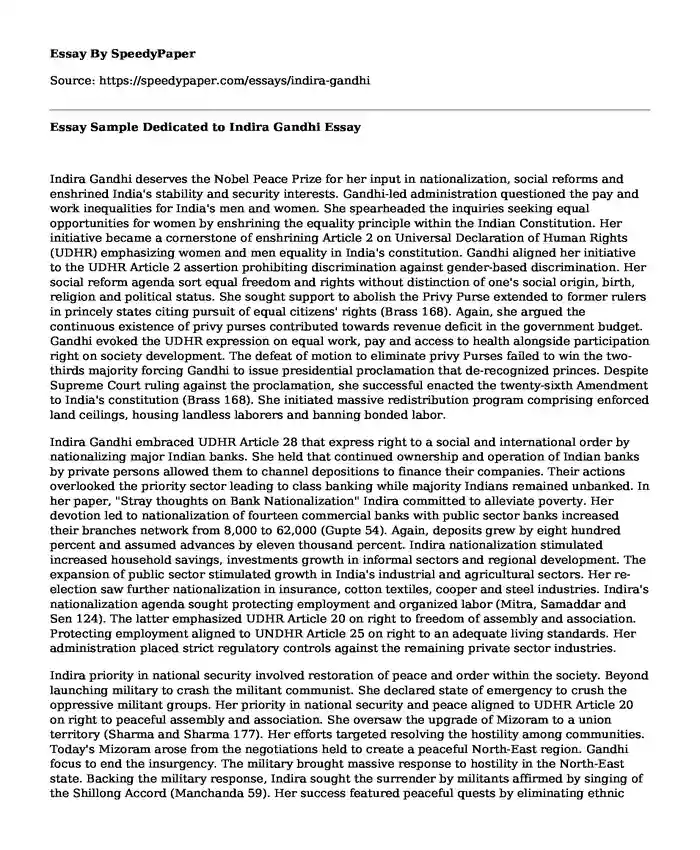
| Type of paper: | Essay |
| Categories: | Personality India Personal leadership |
| Pages: | 3 |
| Wordcount: | 658 words |
Indira Gandhi deserves the Nobel Peace Prize for her input in nationalization, social reforms and enshrined India's stability and security interests. Gandhi-led administration questioned the pay and work inequalities for India's men and women. She spearheaded the inquiries seeking equal opportunities for women by enshrining the equality principle within the Indian Constitution. Her initiative became a cornerstone of enshrining Article 2 on Universal Declaration of Human Rights (UDHR) emphasizing women and men equality in India's constitution. Gandhi aligned her initiative to the UDHR Article 2 assertion prohibiting discrimination against gender-based discrimination. Her social reform agenda sort equal freedom and rights without distinction of one's social origin, birth, religion and political status. She sought support to abolish the Privy Purse extended to former rulers in princely states citing pursuit of equal citizens' rights (Brass 168). Again, she argued the continuous existence of privy purses contributed towards revenue deficit in the government budget. Gandhi evoked the UDHR expression on equal work, pay and access to health alongside participation right on society development. The defeat of motion to eliminate privy Purses failed to win the two-thirds majority forcing Gandhi to issue presidential proclamation that de-recognized princes. Despite Supreme Court ruling against the proclamation, she successful enacted the twenty-sixth Amendment to India's constitution (Brass 168). She initiated massive redistribution program comprising enforced land ceilings, housing landless laborers and banning bonded labor.
Indira Gandhi embraced UDHR Article 28 that express right to a social and international order by nationalizing major Indian banks. She held that continued ownership and operation of Indian banks by private persons allowed them to channel depositions to finance their companies. Their actions overlooked the priority sector leading to class banking while majority Indians remained unbanked. In her paper, "Stray thoughts on Bank Nationalization" Indira committed to alleviate poverty. Her devotion led to nationalization of fourteen commercial banks with public sector banks increased their branches network from 8,000 to 62,000 (Gupte 54). Again, deposits grew by eight hundred percent and assumed advances by eleven thousand percent. Indira nationalization stimulated increased household savings, investments growth in informal sectors and regional development. The expansion of public sector stimulated growth in India's industrial and agricultural sectors. Her re-election saw further nationalization in insurance, cotton textiles, cooper and steel industries. Indira's nationalization agenda sought protecting employment and organized labor (Mitra, Samaddar and Sen 124). The latter emphasized UDHR Article 20 on right to freedom of assembly and association. Protecting employment aligned to UNDHR Article 25 on right to an adequate living standards. Her administration placed strict regulatory controls against the remaining private sector industries.
Indira priority in national security involved restoration of peace and order within the society. Beyond launching military to crash the militant communist. She declared state of emergency to crush the oppressive militant groups. Her priority in national security and peace aligned to UDHR Article 20 on right to peaceful assembly and association. She oversaw the upgrade of Mizoram to a union territory (Sharma and Sharma 177). Her efforts targeted resolving the hostility among communities. Today's Mizoram arose from the negotiations held to create a peaceful North-East region. Gandhi focus to end the insurgency. The military brought massive response to hostility in the North-East state. Backing the military response, Indira sought the surrender by militants affirmed by singing of the Shillong Accord (Manchanda 59). Her success featured peaceful quests by eliminating ethnic conflicts guided by right to peaceful association, assembly, national security, and assembly. Such arose in leading successful peace platform citing Indira's agreement with Shimia and Pakistan.
Works Cited
Brass, Paul R. Routledge Handbook of South Asian Politics: India, Pakistan, Bangladesh, Sri . Routledge: New York, 2010.
Gupte, Pranay. Mother India: A Political Biography of Indira Gandhi. New York : Penguin Books, 2012.
Manchanda, Rita. SAGE Series in Human Rights Audits of Peace Processes: Five-Volume Set. New Delhi : SAGE Publications, 2015.
Mitra, Iman Kumar, Ranabir Samaddar and Samita Sen. Accumulation in Post-Colonial Capitalism. Singapore : Springer, 2016.
Sharma, Suresh Kant and Usha Sharma. Discovery of North-East India: Geography, History, Cutlure, Religion, Politics, Sociology, Science, Education and Economy. New Delhi : Mittal, 2015.
Cite this page
Essay Sample Dedicated to Indira Gandhi. (2022, Jun 01). Retrieved from https://speedypaper.net/essays/indira-gandhi
Request Removal
If you are the original author of this essay and no longer wish to have it published on the SpeedyPaper website, please click below to request its removal:
- Essay Example on Budgeting in Businesses
- Essay Sample on Exhibitor Rules and Regulations
- Comparison Essay Example: ASUS ROG G55VW and MacBook Pro 15-inch screen
- Essay Sample on The Etiology of Sexual Aggression
- Dynamic Change in Walter Lee Younger - Free Essay Example
- The American Constitution and Its Amendments - Essay Sample
- Academic Analysis Sample: Why Nature and Nurture Won't Go Away
Popular categories




